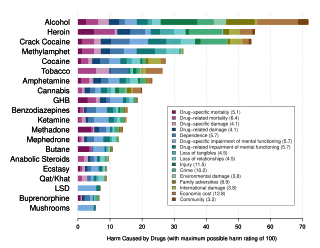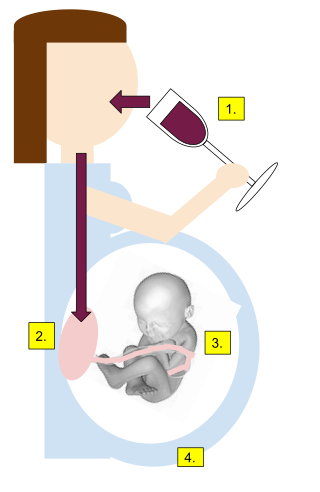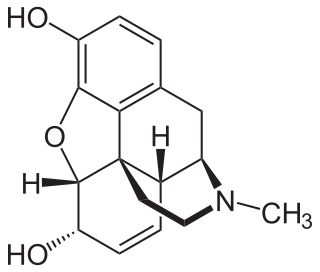The Substance Abuse and Mental Health Services Administration is a branch of the U.S. Department of Health and Human Services. SAMHSA is charged with improving the quality and availability of treatment and rehabilitative services in order to reduce illness, death, disability, and the cost to society resulting from substance abuse and mental illnesses. The Administrator of SAMHSA reports directly to the Secretary of the U.S. Department of Health and Human Services. SAMHSA's headquarters building is located outside of Rockville, Maryland.

Drug rehabilitation is the process of medical or psychotherapeutic treatment for dependency on psychoactive substances such as alcohol, prescription drugs, and street drugs such as cannabis, cocaine, heroin, and amphetamines. The general intent is to enable the patient to confront substance dependence, if present, and stop substance misuse to avoid the psychological, legal, financial, social, and medical consequences that can be caused.

Alcohol dependence is a previous psychiatric diagnosis in which an individual is physically or psychologically dependent upon alcohol.

Opioid use disorder (OUD) is a substance use disorder characterized by cravings for opioids, continued use despite physical and/or psychological deterioration, increased tolerance with use, and withdrawal symptoms after discontinuing opioids. Opioid withdrawal symptoms include nausea, muscle aches, diarrhea, trouble sleeping, agitation, and a low mood. Addiction and dependence are important components of opioid use disorder.
Drugs and prostitution have been documented to have a direct correlation.
A methadone clinic is a medical facility where medications for opioid use disorder (MOUD) are dispensed-—historically and most commonly methadone, although buprenorphine is also increasingly prescribed. Medically assisted drug therapy treatment is indicated in patients who are opioid-dependent or have a history of opioid dependence. Methadone is a schedule II (USA) opioid analgesic, that is also prescribed for pain management. It is a long-acting opioid that can delay the opioid withdrawal symptoms that patients experience from taking short-acting opioids, like heroin, and allow time for withdrawal management. In the United States, by law, patients must receive methadone under the supervision of a physician, and dispensed through the Opioid Treatment Program (OTP) certified by the Substance Abuse and Mental Health Services Administration and registered with the Drug Enforcement Administration.

College health is a desired outcome created by a constellation of services, programs and policies directed at advancing the health and wellbeing of individuals enrolled in an institution of higher education, while also addressing and improving both population health and community health. Many colleges and universities worldwide apply both health promotion and health care as processes to achieve key performance indicators in college health. The variety of healthcare services provided by any one institution range from first aid stations employing a single nurse to large, accredited, multi-specialty ambulatory healthcare clinics with hundreds of employees. These services, programs and policies require a multidisciplinary team, the healthcare services alone include physicians, physician assistants, administrators, nurses, nurse practitioners, mental health professionals, health educators, athletic trainers, dietitians and nutritionists, and pharmacists. Some of the healthcare services extend to include massage therapists and other holistic health care professionals. While currently changing, the vast majority of college health services are set up as cost centers or service units rather than as parts of academic departments or health care delivery enterprises.
Treatment Improvement Protocols (TIPs) are a series of best-practice manuals for the treatment of substance use and other related disorders. The TIP series is published by the Substance Abuse and Mental Health Services Administration (SAMHSA), an operational division of the U.S. Department of Health and Human Services.
SMART Recovery is an international community of peer support groups that help people recover from addictive and problematic behaviors, using a self-empowering and evidence-informed program. SMART stands for Self-Management and Recovery Training. The SMART approach is secular and research-based. SMART has a global reach with a presence established in more than 30 countries. SMART Recovery is effective with a range of addictive and problematic behaviors.

Substance abuse prevention, also known as drug abuse prevention, is a process that attempts to prevent the onset of substance use or limit the development of problems associated with using psychoactive substances. Prevention efforts may focus on the individual or their surroundings. A concept that is known as "environmental prevention" focuses on changing community conditions or policies so that the availability of substances is reduced as well as the demand. Individual Substance Abuse Prevention, also known as drug abuse prevention involves numerous different sessions depending on the individual to help cease or reduce the use of substances. The time period to help a specific individual can vary based upon many aspects of an individual. The type of Prevention efforts should be based upon the individual's necessities which can also vary. Substance use prevention efforts typically focus on minors and young adults — especially between 12–35 years of age. Substances typically targeted by preventive efforts include alcohol, tobacco, marijuana, inhalants, coke, methamphetamine, steroids, club drugs, and opioids. Community advocacy against substance use is imperative due to the significant increase in opioid overdoses in the United States alone. It has been estimated that about one hundred and thirty individuals continue to lose their lives daily due to opioid overdoses alone.
Services for mental health disorders provide treatment, support, or advocacy to people who have psychiatric illnesses. These may include medical, behavioral, social, and legal services.

Substance use disorder (SUD) is the persistent use of drugs despite substantial harm and adverse consequences to self and others. Related terms include substance use problems and problematic drug or alcohol use.

Addiction is a neuropsychological disorder characterized by a persistent and intense urge to use a drug or engage in a behavior that produces natural reward, despite substantial harm and other negative consequences. Repetitive drug use often alters brain function in ways that perpetuate craving, and weakens self-control. This phenomenon – drugs reshaping brain function – has led to an understanding of addiction as a brain disorder with a complex variety of psychosocial as well as neurobiological factors that are implicated in addiction's development.
Addiction psychiatry is a medical subspecialty within psychiatry that focuses on the evaluation, diagnosis, and treatment of people who have one or more disorders related to addiction. This may include disorders involving legal and illegal drugs, gambling, sex, food, and other impulse control disorders. Addiction psychiatrists are substance use disorder experts. Growing amounts of scientific knowledge, such as the health effects and treatments for substance use disorders, have led to advancements in the field of addiction psychiatry. These advancements in understanding the neurobiology of rewarding behavior, along with federal funding, has allowed for ample opportunity for research in the discipline of addiction psychiatry. Addiction psychiatry is an expanding field, and currently there is a high demand for substance use disorder experts in both the private and public sector.
About 1 in 7 Americans reportedly suffered from active addiction to a particular substance. Addiction can cause physical, emotional and psychological harm to those affected by it. The American Society of Addiction Medicine defines addiction as "a treatable, chronic medical disease involving complex interactions among brain circuits, genetics, the environment, and an individual's life experiences. People with addiction use substances or engage in behaviors that become compulsive and often continue despite harmful consequences."
The American Academy for Addiction Psychiatry (AAAP) is a professional organization and an accredited Continuing Medical Education (CME) provider, based in East Providence, Rhode Island, USA. Its members are specialists in addiction psychiatry and other health care professionals who treat patients with addictions. AAAP provides medical education programs in the field of addiction psychiatry.

The TAMAR Education Project is a manualized 10-week mental health intervention for justice-involved women and men with histories of psychological trauma which combines psycho-educational approaches and expressive therapies. It is designed for clients who have a recent treatment history for a mental health condition, a substance use disorder, and a history of physical and/or sexual abuse. TAMAR Groups have been implemented inside detention centers, state psychiatric hospitals, and in the community.
Discrimination against people with substance use disorders is a form of discrimination against people with this disease. In the United States, people with substance use disorders are often blamed for their disease, which is often seen as a moral failing, due to a lack of public understanding about substance use disorders being diseases of the brain with 40-60% heritability. People with substance use disorders are likely to be stigmatized, whether in society or healthcare.
Screening, Brief Intervention and Referral to Treatment (SBIRT) is a model that encourages mental health and substance use screenings as a routine preventive service in healthcare.








